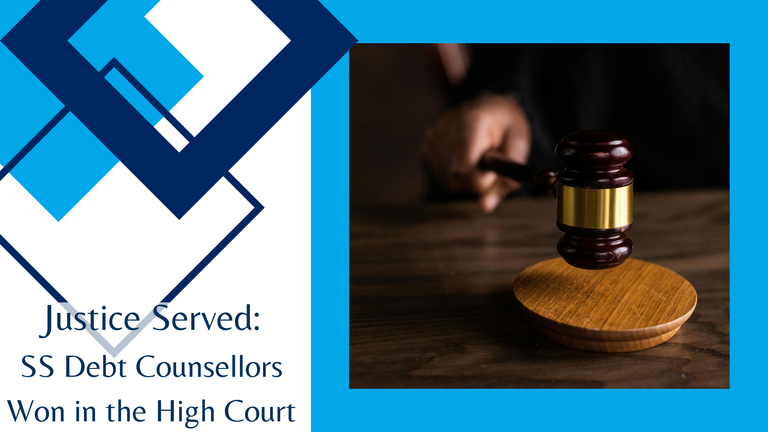
Justice Served: How SS Debt Counsellors Won in the High Court – big win for consumers
Major Legal Victory for Consumers: Landmark Debt Review Ruling in Pretoria High Court
In a ground breaking legal victory, the Pretoria High Court has delivered a decisive ruling on May 12, 2025, that could reshape the landscape of debt review in South Africa. Spearheaded by SS Debt Counsellors, under the guidance of Debt Counsellor Chantelle Scott (NCRDC3858) and driven by Chris Koen (BLC, LLB) – In-house Legal Advisor, this case brought clarity to the interpretation of Section 103(5) of the National Credit Act, specifically the statutory in duplum rule.
Why This Case Matters:
- Clarifies the application of Section 103(5) and ensures consumers under debt review are protected from excessive debt accumulation.
- Strengthens consumer rights against unfair credit practices, reinforcing the integrity of the National Credit Act.
- Opens doors for financial relief, as affected borrowers may be entitled to repayments from credit providers who exceeded statutory limits.
SS Debt Counsellors has long championed transparency and fairness within South Africa’s credit industry. This ruling serves as a wake-up call to lenders, pushing for greater accountability in how they calculate interest and fees for consumers undergoing debt review.
“This decision represents a monumental shift in consumer protection and reinforces our commitment to ensuring South Africans are not unfairly burdened by excessive debt,” said Chantelle Scott, Debt Counsellor at SS Debt Counsellors. “Many borrowers have unknowingly overpaid, and this ruling provides legal grounds to seek financial justice.”
Legal expert Chris Koen added, “This case is a step forward in safeguarding debt review clients against unlawful interest accumulation. Credit providers must align their practices with the clear guidelines set forth by the court, ensuring borrowers receive fair and lawful treatment.”
As consumers, legal experts, and debt counsellors absorb the impact of this decision, SS Debt Counsellors is encouraging affected individuals to review their debt agreements and seek legal guidance if they suspect they have overpaid on their outstanding balances.
It’s a big win for consumers and could mean some people have overpaid their debts without realizing it. Here’s a simple breakdown of what happened and what it means for regular people.
What Was the Problem?
For years, SS Debt Counsellors (who help people manage overwhelming debt) and banks have disagreed about how section 103(5) works. This section says that if someone falls behind on payments (called “defaulting”), banks can’t charge more interest and fees than the capital amount the person owed when they first missed payments. For example, if you owed R10,000 when you defaulted, the bank can’t pile on extra charges beyond that amount.
The issue was whether this rule still applies when someone enters a debt review plan. A debt review plan is a new payment arrangement, either agreed with the bank or ordered by a court, to help someone pay off their debts more manageably. SS Debt Counsellors, said the rule should still apply because the person is still behind on the original loan. Banks, represented by the Banking Association of South Africa (BASA), argued that once a new payment plan starts, the person is no longer in default, so they can charge more interest and fees.
This dispute caused big problems. In some cases, SS Debt Counsellors helped people fully settled debts, like home loans or car finance. But banks refused to release important documents, like car registration papers or house title deeds, claiming the debts weren’t paid off. They even said some people still owed huge amounts, like R500,000 to R1.2 million!
What Did the Court Say?
The Pretoria High Court heard the case on February 11, 2025, and ruled in favour of SS Debt Counsellors. The court said that entering a debt review plan doesn’t erase the original default on the loan. This means section 103(5) still applies, and banks can’t keep adding unlimited interest and fees while someone is under debt review. The court agreed with SS Debt Counsellors that the law treats the original loan and the debt review plan as separate things, so the protection for consumers stays in place.
The banks’ argument—that a new payment plan “fixes” the default—was rejected. The court pointed out that the law doesn’t say the original default disappears, and if lawmakers wanted that, they would have written it clearly.
What Does This Mean for You?
This ruling is good news for people struggling with debt:
- Protection from Overcharging: Banks can’t charge more in interest and fees than what you owed when you first fell behind, even if you’re in a debt review plan. This keeps your debt from growing out of control.
- Possible Refunds: If you settled a debt (like a home loan or car finance) in the last three years but overpaid because the bank calculated it wrong, you might be able to claim some money back. Talk to a debt counsellor or lawyer to check.
- Fairer Treatment: Banks can no longer demand huge amounts or hold onto documents like car papers or house deeds after you’ve settled your debt under debt review.
What Happens Next?
The banks might appeal the decision, so things could change. But for now, this ruling supports what SS Debt Counsellors have been saying since 2013: many banks have been calculating debts incorrectly, leading to overpayments. This could affect a lot of people who’ve been under debt review.
What Should You Do?
If you’re in debt review or have settled debts in the past few years, contact a debt counsellor to see if this ruling applies to you. They can help figure out if you’ve overpaid or if banks are unfairly demanding more money. If you’re struggling with debt, a debt counsellor can also guide you through the process of restructuring your payments to make them more affordable.
This ruling is a step toward fairer treatment for people in debt, ensuring banks follow the law and don’t take advantage of those trying to get back on track.
.
